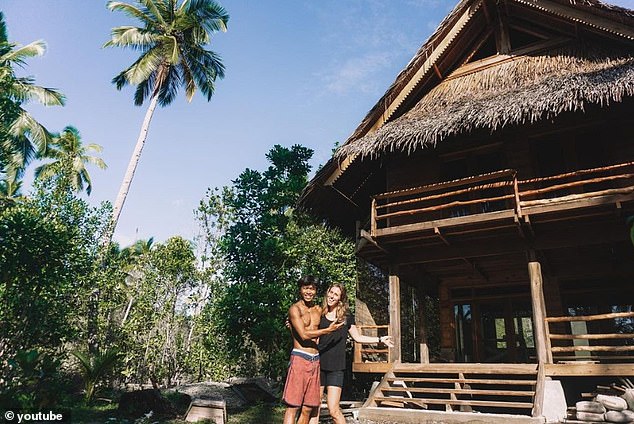Living off coconuts, collecting rainwater and having no phone signal: welcome to island life.
Surfers Marjolein and her partner star in a documentary in which they talk about how they abandoned modern conveniences to live off the grid on a tropical outcrop on Indonesia’s Mentawai Islands.
In the short film Exploring alternativesThey reveal what their daily routine is really like and how they survive living off the land.
Marjolein, originally from Belgium, explains in the introduction: ‘We live on a small island in Indonesia. The island we are on is about 5km in diameter and there are no towns or roads…so all transportation is by boat using locally handcrafted wooden boats.
“We’re completely off the grid. What I like most about living here is the feeling of independence. We can generate our own electricity, our own water, our own food and that’s great.”
Surfers Marjolein and her partner star in a documentary where they talk about how they abandoned modern conveniences to live off the grid on a tropical outcrop in Indonesia.
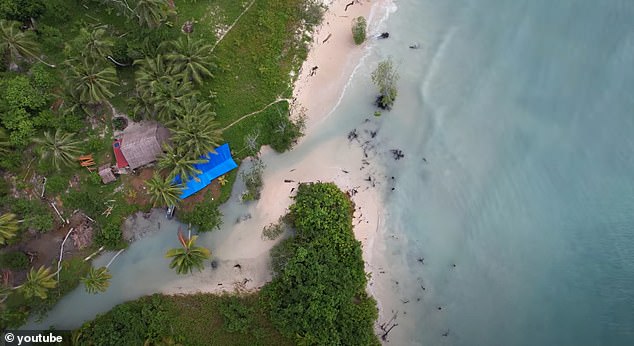
Marjolein, originally from Belgium, explains in the introduction: ‘We live on a small island in Indonesia. The island we are on is about 5 kilometers in diameter and there are no towns or roads.
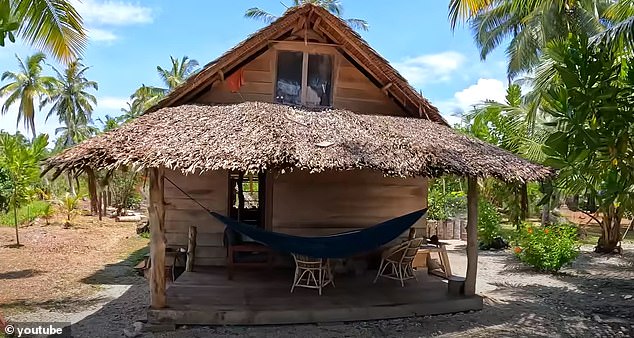
The couple says one of the things they love most about life on the island is the “sense of independence.”
The couple met while working at a surf resort on another island.
But in an attempt to try something different, they quit their jobs at the end of 2020 and bought the land where they currently live.
Fortunately, An is a skilled carpenter and builder and set about building a small wooden house for them to live in.
In the film, Marjolein explains that the biggest challenge of building on the island is logistics, as everything must be transported by boat, “even materials that are sourced locally.”
He adds: “Then all the other (building materials) that have to come from the mainland have to come on a ferry that arrives once a week.”
‘Then we have to pick him up on the ferry, but the problem is that we don’t have Internet or 4G or phone reception here.
‘To actually order things from the mainland, we have to go out with our little boat, find some better signal and try to send a message to the store on the mainland.
‘(So) we expect them to be online, wait for a response and yes… that can take days just to ask for one small thing. That’s why things don’t go so fast here.’
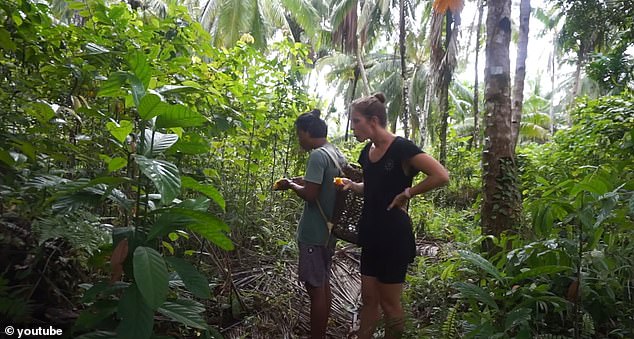
The couple met while working at a surf resort on another island.
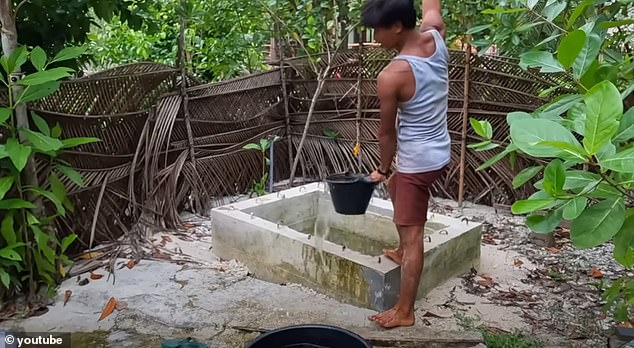
The couple built a small well on their property that they use for showering and washing dishes.
To power their construction tools, the couple has a small generator and they also have a small solar panel with a battery to charge their devices and for night lights.
But Marjolein notes that “very soon” they will have a “bigger facility” on the island, with more solar panels installed on an attached building.
When it comes to food supplies, the duo buys something from a shop on a nearby island and also looks for fruits and vegetables, with bananas, mangoes and durian among the seasonal produce.
As for proteins, Marjolein says they “rely heavily on the ocean.”
He adds: ‘We go fishing about twice a week. We usually fish with a speargun. We also have a casting net and a hand line.
‘As we don’t have a fridge, we usually smoke the fish in our traditional Mentawai stove, which is an important part of our setup and lasts much longer that way.
‘We also have chickens for their eggs.’
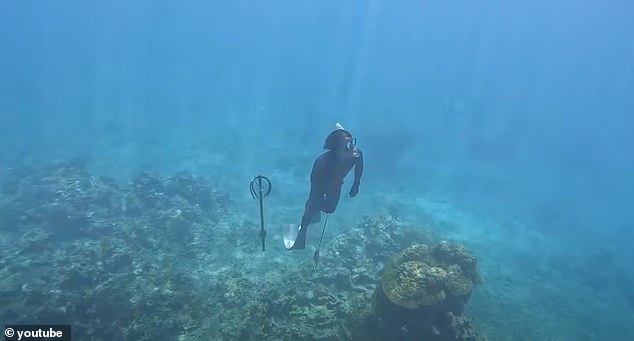
For protein, they “rely heavily on the ocean” and go fishing twice a week.
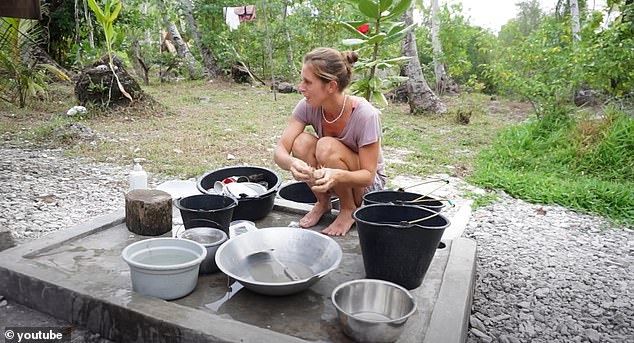
To drink water, the couple collects rainwater which they pass through a filter, while to shower and wash dishes they dig a well on their property.
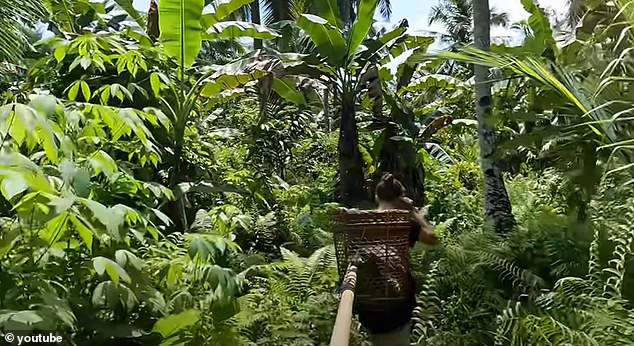
When it comes to food supplies, the duo buys some groceries from a store on a nearby island and also looks for fruits and vegetables.
To drink water, the couple collects rainwater that passes through a filter, while to shower and wash dishes they dig a well on their property.
To make life on the island more comfortable, the couple is currently in the process of building a larger house with a terrace, kitchen, two bedrooms and a bathroom.
Referring to the house construction project while giving viewers a tour, Marjolein says: “WWell, right now we are investing all our time and savings into this house.
‘WWe are very close to moving now, We just have to finish, like paint one or two walls, and then we still have to get all of our furniture, which is pretty hard to get around here.
“There are no furniture stores or anything like that, so we either make them ourselves or local craftsmen make them.”
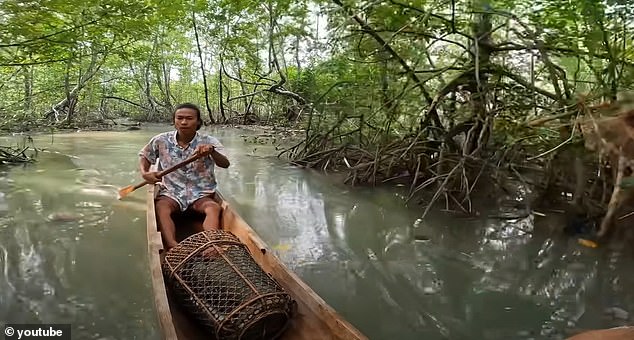
While she loves island life, Marjoein says some of the hardest things include the unpredictable weather, the threat of deadly snakes and the lack of people.
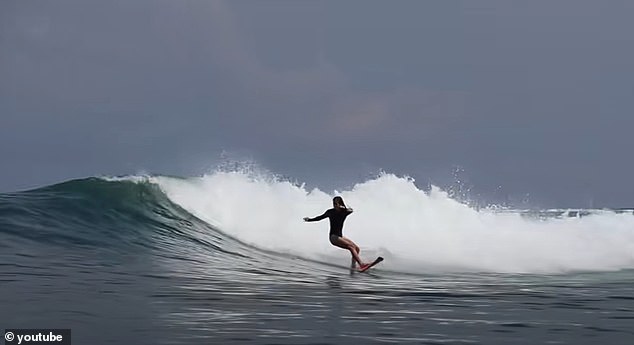
In an attempt to connect with others, Marjolein recently began documenting her and An’s journey and adventures through YouTube.
While she loves island life, Marjolein says some of the hardest things include the unpredictable weather, the threat of deadly snakes and the lack of people.
She reflects: “Since we live in such remote places, we can definitely feel a little alone at times and that’s not always easy.”
“I would say for me that is definitely one of the biggest challenges of living here.”
In an attempt to connect with other people, Marjolein recently began documenting her journey and adventures with An through YouTube, on her channel called @OurIslaVida.
And he concludes: “Being able to share this lifestyle with people from all over the world and connect with people has been truly amazing.”


